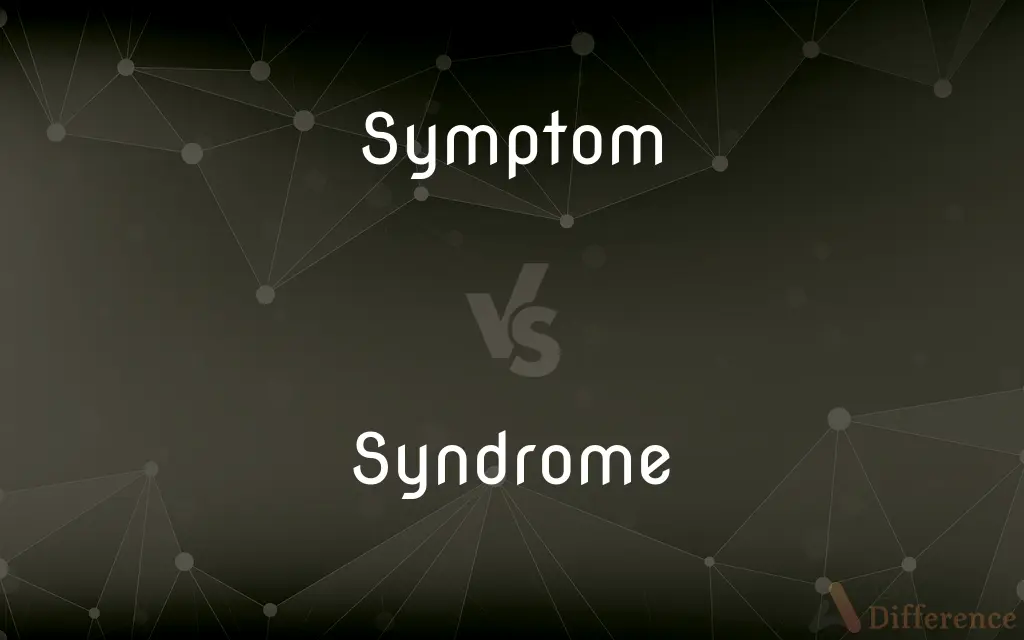Symptom vs. Syndrome — What's the Difference?
By Tayyaba Rehman — Updated on September 28, 2023
A symptom is a sign or manifestation of a condition, while a syndrome is a collection of related symptoms that characterize a specific disorder or condition.

Difference Between Symptom and Syndrome
Table of Contents
ADVERTISEMENT
Key Differences
A symptom refers to a single, observable indication of an illness or disorder, often experienced by a patient. For instance, a cough or fever may be a symptom of the flu. On the other hand, a syndrome is a group or cluster of symptoms that consistently occur together, pointing towards a particular medical condition. For instance, Down syndrome is identified by a specific set of physical and mental characteristics.
When physicians diagnose illnesses, they often start by examining individual symptoms. A patient might initially seek medical attention due to a specific symptom. In contrast, a syndrome provides a more comprehensive understanding of what might be happening. For example, if a person shows a consistent group of symptoms, doctors might identify it as a specific syndrome.
Symptom can be subjective or objective. A subjective symptom is something a patient feels but can't be observed, like pain. An objective symptom, like a rash, can be observed. A syndrome, however, is typically recognized by a consistent pattern, regardless of its subjective or objective nature.
In the medical field, understanding and recognizing symptoms are crucial as they serve as initial indicators of health issues. Syndromes, however, aid in narrowing down diagnoses and can even dictate specific treatment plans. For example, a symptom like shortness of breath might be caused by various conditions, but if it's part of a known syndrome, it provides a clearer picture.
It's essential to remember that while all syndromes comprise symptoms, not all symptoms indicate a syndrome. A symptom like a headache can be due to various causes, from stress to dehydration, and doesn't necessarily point to a specific syndrome.
ADVERTISEMENT
Comparison Chart
Definition
An indication of a specific condition.
A collection of related symptoms characterizing a disorder.
Nature
Can be singular.
Always involves multiple symptoms.
Example
Fever, cough, headache.
Down syndrome, Carpal tunnel syndrome.
Diagnostic Role
Initial indicator of health issues.
Provides a clearer diagnostic picture.
Subjectivity
Can be subjective or objective.
Identified by consistent patterns of symptoms.
Compare with Definitions
Symptom
An observable indication of a disease or disorder.
The rash was a symptom of the allergic reaction.
Syndrome
A group of symptoms indicative of a particular disease or condition.
Carpal tunnel syndrome is characterized by hand and wrist pain.
Symptom
A physical or mental feature suggesting a particular condition.
Fatigue is a common symptom of viral infections.
Syndrome
An aggregation of concurrent symptoms indicating a unique condition.
Restless leg syndrome causes an uncontrollable urge to move the legs.
Symptom
Any characteristic sign of a condition.
Shortness of breath was a symptom he couldn't ignore.
Syndrome
A recognizable pattern of symptoms or abnormalities.
Down syndrome is identified by specific physical and intellectual attributes.
Symptom
A manifestation or evidence of an ailment.
The plant's yellow leaves were a symptom of overwatering.
Syndrome
A complex of symptoms causing a known medical issue.
She was diagnosed with chronic fatigue syndrome due to her persistent tiredness.
Symptom
An indication of a disorder or disease, especially a subjective one such as pain, nausea, or weakness.
Syndrome
A syndrome is a set of medical signs and symptoms which are correlated with each other and often associated with a particular disease or disorder. The word derives from the Greek σύνδρομον, meaning "concurrence".
Symptom
A characteristic sign or indication of the existence of something else
Drought and erratic rainfall as symptoms of climate change.
Syndrome
A group of symptoms that collectively indicate or characterize a disease, disorder, or other condition considered abnormal.
Symptom
(medicine) A perceived change in some function, sensation or appearance of a person that indicates a disease or disorder, such as fever, headache or rash; strictly, a symptom is felt or experienced by the patient, while a sign can be detected by an observer.
Swollen breasts, morning sickness, and a missed period are classic symptoms of pregnancy.
Syndrome
A complex of symptoms indicating the existence of an undesirable condition or quality
Suffers from fear-of-success syndrome.
Symptom
(figuratively) A signal; anything that indicates, or is characteristic of, the presence of something else, especially of something undesirable.
Lying, hiding one's true feelings, and having affairs are typical symptoms of a doomed marriage.
Syndrome
A distinctive or characteristic pattern of behavior
The syndrome of conspicuous consumption in wealthy suburbs.
Symptom
Any affection which accompanies disease; a perceptible change in the body or its functions, which indicates disease, or the kind or phases of disease; as, the causes of disease often lie beyond our sight, but we learn their nature by the symptoms exhibited.
Like the sick man, we are expiring with all sorts of good symptoms.
Syndrome
A group of anatomical and often physiological characteristics of an organism that serve a specific function and are presumed to have evolved together
The angiosperm reproductive syndrome.
Symptom
A sign or token; that which indicates the existence of something else; as, corruption in elections is a symptom of the decay of public virtue.
Syndrome
(pathology) A recognizable pattern of signs, symptoms and/or behaviours, especially of a disease or medical or psychological condition.
Down syndrome; acquired immune deficiency syndrome; restless-leg syndrome; battered-wife syndrome
Symptom
(medicine) any sensation or change in bodily function that is experienced by a patient and is associated with a particular disease
Syndrome
Any set of characteristics regarded as identifying a certain type, condition, etc., usually adverse.
Not-in-my-backyard syndrome; tip-of-the-tongue syndrome
Symptom
Anything that accompanies X and is regarded as an indication of X's existence
Syndrome
Concurrence.
Symptom
A subjective or objective indication of a health problem.
She reported pain as her primary symptom.
Syndrome
A group of symptoms occurring together that are characteristic and indicative of some underlying cause, such as a disease.
Syndrome
Generally, a pattern of characteristics or behaviors occurring together, that are sufficiently common and distinctive to indicate that they are due to a known cause.
Syndrome
A complex of concurrent things;
Every word has a syndrome of meanings
Syndrome
A pattern of symptoms indicative of some disease
Syndrome
A collection of signs and symptoms associated with a specific health challenge.
Metabolic syndrome includes high blood pressure, high sugar levels, and other health issues.
Common Curiosities
Is a syndrome always a sign of disease?
Not always. A syndrome is a pattern of symptoms, but it doesn't necessarily mean a disease is present.
How are syndromes diagnosed?
Syndromes are diagnosed by recognizing a consistent pattern of symptoms and conducting appropriate tests.
Can a single medical condition have multiple symptoms?
Yes, a single condition can manifest through multiple symptoms.
Are all symptoms visible?
No, some symptoms, like pain, are subjective and felt only by the patient.
How is a syndrome different from a symptom?
A syndrome is a collection of related symptoms that together indicate a particular disorder or condition.
Can symptoms be temporary?
Yes, symptoms can be transient and might disappear on their own or with treatment.
Are syndromes genetic?
Some syndromes, like Down syndrome, have a genetic basis, but not all are hereditary.
What is a symptom?
A symptom is an observable indication or manifestation of a specific disease or condition.
Can a symptom exist on its own?
Yes, a symptom can exist individually without being part of a syndrome.
How many symptoms make up a syndrome?
It varies. A syndrome can have as few as two related symptoms or many more.
Can symptoms be treated individually?
Yes, individual symptoms can often be treated, but addressing the root cause is crucial.
Share Your Discovery

Previous Comparison
Innocence vs. Purity
Next Comparison
Thread vs. StrandAuthor Spotlight
Written by
Tayyaba RehmanTayyaba Rehman is a distinguished writer, currently serving as a primary contributor to askdifference.com. As a researcher in semantics and etymology, Tayyaba's passion for the complexity of languages and their distinctions has found a perfect home on the platform. Tayyaba delves into the intricacies of language, distinguishing between commonly confused words and phrases, thereby providing clarity for readers worldwide.














































